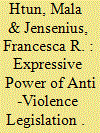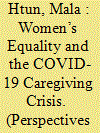| Srl | Item |
| 1 |
ID:
184993


|
|
|
|
|
| Summary/Abstract |
We know more about why laws on violence against women (VAW) were adopted than about how much and in what ways these laws affect society. The authors argue that even weakly enforced laws can contribute to positive social change. They theorize the expressive power of VAW legislation, and present evidence for a cautiously optimistic assessment of current trends on violence against women and the ways that VAW laws affect social norms. Focusing on a time of major legal change related to VAW in Mexico, this article explores trends in behavior and attitudes related to violence by analyzing four waves of the National Survey on the Dynamics of Household Relations (ENDIREH), which include detailed interviews with thousands of Mexican women. The authors find that over this period, the share of women experiencing intimate-partner abuse declined, attitudes condoning violence shifted, reporting rates rose, and most women learned about legislation to protect their rights. These changes are consistent with the authors’ expectations about the expressive power of anti-violence legislation.
|
|
|
|
|
|
|
|
|
|
|
|
|
|
|
|
| 2 |
ID:
186658


|
|
|
|
|
| Summary/Abstract |
The COVID-19 pandemic revealed, but did not create, the caregiving crisis in the United States: for most people, it was already a major ordeal to provide reproductive labor. The caregiving crisis was less visible before the pandemic because it was suffered unequally, in part due to the different positions of American women. Some women paid other women to do care work, women received differing sets of benefits from federal and state governments, and some women got far more support from their employers than did others. Pandemic-induced shocks, including the closure of K–12 schools and childcare centers, and reduced access to domestic workers and elder care workers, seemed to have triggered a closer alignment of perspectives and interests among diverse women. Although women’s demands for support seem to have pushed the Biden administration to propose more expansive family policies, stereotypes and norms that marginalize care work and care workers within families and across the economy also need to change to achieve equality for women.
|
|
|
|
|
|
|
|
|
|
|
|
|
|
|
|